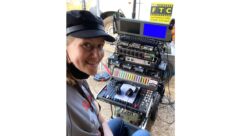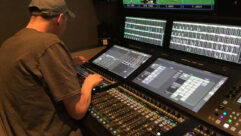Noise Awareness Day Alerts Public to Turn Down the Volume
Apr 26, 2006 4:26 PM
April 26 is International Noise Awareness Day, and an opportunity to alert the public about the risk of noisy activities to hearing health. Nearly 10 million Americans have permanent noise-induced hearing loss, and many cases are due to noise exposure from a combination of loud recreational activities and higher noise levels in the environment.
Certain activities, like attending loud rock concerts, nightclubs, car races and sports events, or turning up the volume on your stereo headphones, can pose a risk to your hearing. Since noisy activities are particularly popular with teens, the House Ear Institute (HEI) has launched a teen awareness campaign called “It’s How You Listen That Counts,” which delivers a strong hearing conservation message through a website (www.earbud.org) and an educational spot showing on MTV and several Yahoo! Sites.
Institute experts caution that sounds at or above 85 decibels (dB) may cause permanent hearing loss with prolonged or repeated exposure. They advise that if you’re exposing yourself to loud sound levels at work and play, it’s time to put yourself on a “noise diet.”
How loud is too loud and how do we protect ourselves? “In general, if you have to raise your voice to be heard, the environment may be too loud for your ears,” says researcher Sig Soli, Ph.D., House Ear Institute. “The louder the sound, the less time it takes before your hearing is affected. A rock concert can expose you to 100 decibels or more of damaging sound – and 15 minutes is the maximum duration of safe daily exposure to that sound level. Cranking up the volume too high on a stereo headset can pose a similar risk, especially if you’re listening for long periods of time.”
Prolonged exposure to sound levels associated with routine activities such as blow-drying your hair, mowing the lawn, and using power tools at home may also pose a risk. Institute experts urge people to reduce volume levels when possible and wear earplugs when participating in noisy activities. The duration and frequency of sound exposure, intensity of sound signal, and individual susceptibility may contribute to risk.
“Damage to the auditory system from exposure to loud sounds may take place without pain or discomfort to your ears,” says research audiologist Andy Vermiglio, M.A., CCC-A, FAAA, House Ear Institute. “Unfortunately, many people can feel comfortable in a loud environment and not realize the damage that is occurring to their ears.”
For more information, visit www.hei.org.










